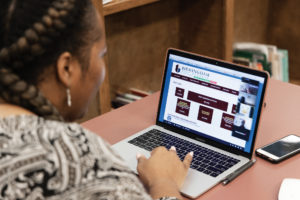
As Election Day loomed in November, Tambra Clark put her students to work at South Hampton Elementary School in Birmingham, instructing them to put together infographics — flyers using mostly photos — about the electoral process.
“They created Canva accounts,” she says, referring to an online tool that helped them with the mechanics. “We gave them the dimensions and a rubric.”
What the 7th and 8th graders produced shocked Clark, who is in her 16th year of education and fifth as South Hampton’s library media specialist.
“When I say the work was outstanding, it really looked professional,” she says. “I didn’t expect it to go so well. That may sound like a small thing to you and other people, but that was a really big deal for me.”
For Clark, it was evidence that Ed Farm, a program she is helping to pilot with Apple, is working. Officially launched by Apple CEO Tim Cook during a visit to Birmingham in February 2020, Ed Farm leverages coding and equipment from Apple to teach students and adults skills they need to succeed in the computer industry. In September, Ed Farm was among the inaugural winners of the AlabamaWorks! Innovator Awards, presented by Gov. Kay Ivey to highlight programs taking innovative approaches to solving workforce challenges.
“We want to make sure we’re creating an inventive world where all people have access to the tools they can use to create or fill the jobs of the future,” says Waymond Jackson, CEO of Ed Farm.
Jackson, then with the Birmingham Business Alliance, was among those who joined Birmingham Mayor Randall Woodfin on a 2017 trip to Chicago to observe the Everyone Can Code program, an Apple initiative that provides coding training to students. The group wanted to do something similar in Alabama, and Apple listened, “knowing that we had a workforce issue and needed more people in coding,” Jackson says.

Program Director Chris McCauley and a few employees began working on Ed Farm in August 2019. It officially launched on Feb. 27, and Jackson came on as CEO on April 6.
“I had this amazing opportunity to be there from the beginning and understand and know the importance of what we’re doing,” Jackson says. The goal is to take these pilot programs and make them widely available in Alabama schools, Jackson says.
“We’ve been able to get the middle-school elective program that we’re using at South Hampton approved as an official elective throughout the state,” he says. We now have a curriculum that we can take and use in other districts to bring more schools on board. Same with the teachers program — educators can use that to help develop their curriculum.”
The launch has impressed the folks at Apple, particularly in a year that was so disruptive in classrooms.
“From its founding, Ed Farm has brought creativity, community and innovation to the classroom and the Birmingham community,” says Lisa Jackson, Apple’s vice president of environment, policy and social initiatives. “In a year that saw challenges like no other, our teams worked in close partnership with Ed Farm educators to help adapt lesson plans and continue enriching their students’ lives from afar. We’re humbled and excited to partner with so many talented Birmingham teachers and lifelong learners across the community, who bring incredible passion and joy to their teaching and learning.”

Because of COVID-19, Clark launched her Student Fellow pilot program remotely, something that was unexpected but that ended up working.
“We didn’t plan on it, but here we are just really being innovative,” she says. “We’re using this digital technology to meet with each other, even though we didn’t plan on it.”
Each of Clark’s students received an iPad, a lapel microphone and a tripod, equipment far beyond the normal reach of many of them.
“I work in an urban area, where about 90% of the students are at poverty level or below,” she says. “They don’t have the resources others might have. They’re being exposed to state-of-the-art technology simply because of Ed Farm. They’re learning how to use apps and equipment simply because of Ed Farm.”
Already, students are seeing career opportunities in what they’re learning from Ed Farm.
“I have parents who come up to me, and they’re already having those conversations about working for Apple and about digital design,” Clark says. “At first, what they all wanted to do was be a basketball player or maybe a lawyer. Now, this has given them a different opportunity to identify what they may actually be interested in. … I feel like Ed Farm has really given them the opportunity to be exposed to state-of-the-art technology and products that are going to be able to help them compete globally.”
That, Jackson says, is proof that Ed Farm is working.
“We’re extremely pleased with the work that we’ve been doing, but we know there’s a lot more to be done,” he says. “Apple consistently challenges us to think bigger. Now, our mission and focus is how we do this more broadly in the Birmingham region and across the state.”
And just what is Ed Farm doing?
Jackson breaks that down into four areas:
• Teacher Fellows. Ed Farm launched with the Teacher Fellows program, in which Ed Farm staff leads teachers through Apple’s Everyone Can Code and Everyone Can Create curricula. That started with 24 teachers in Birmingham City Schools. “Apple provided the hardware to schools, and we do education oncurriculum design, how to involve digital coding, so that they use this with students in the classroom,” Jackson says.
• Student Fellows. Clark, a teacher fellow, is piloting this program this school year with 20 students at South Hampton. “They use coding to solve issues and learn to do all of these things that are valuable in the work-space,” Jackson says.
• Pathways. This is a “coding bootcamp” to teach adults Apple’s Swift coding language. “We’ve had three cohorts of adult learners, many of whom who never thought they’d be using coding and learning it,”
Jackson says. “We want them to start their pathway here. From here, they can go into deeper learning. They’re using Swift as their first coding language inorder to gain deeper digital skills.”
• Startups. Eventually, Ed Farm wants to be a startup studio or accelerator, taking tech ideas from start to finish.
Innovation Winners
Ed Farm was one of seven inaugural winners of the AlabamaWorks! Alabama Innovation Awards. The other six were:
Beth Brumley, who built the health science program for Colbert County Schools from the ground up.
Sylacauga Alliance for Family Enhancement, which helps job seekers get ready for the workforce regardless of barriers they’ve faced in the past.
Mike Daria, who has fostered relationships between industry and education as superintendent of Tuscaloosa City Schools.
Tiger Mochas, an Auburn City School program in which special education students run a coffee shop on campus.
WeeCat Industries, which teaches the youngest of students, as early as preschool, work ethics and employability skills.
Ed Bushaw, who collaborated with business and industry in Baldwin County to create the first hospitality and tourism registered apprenticeship program in Alabama.



